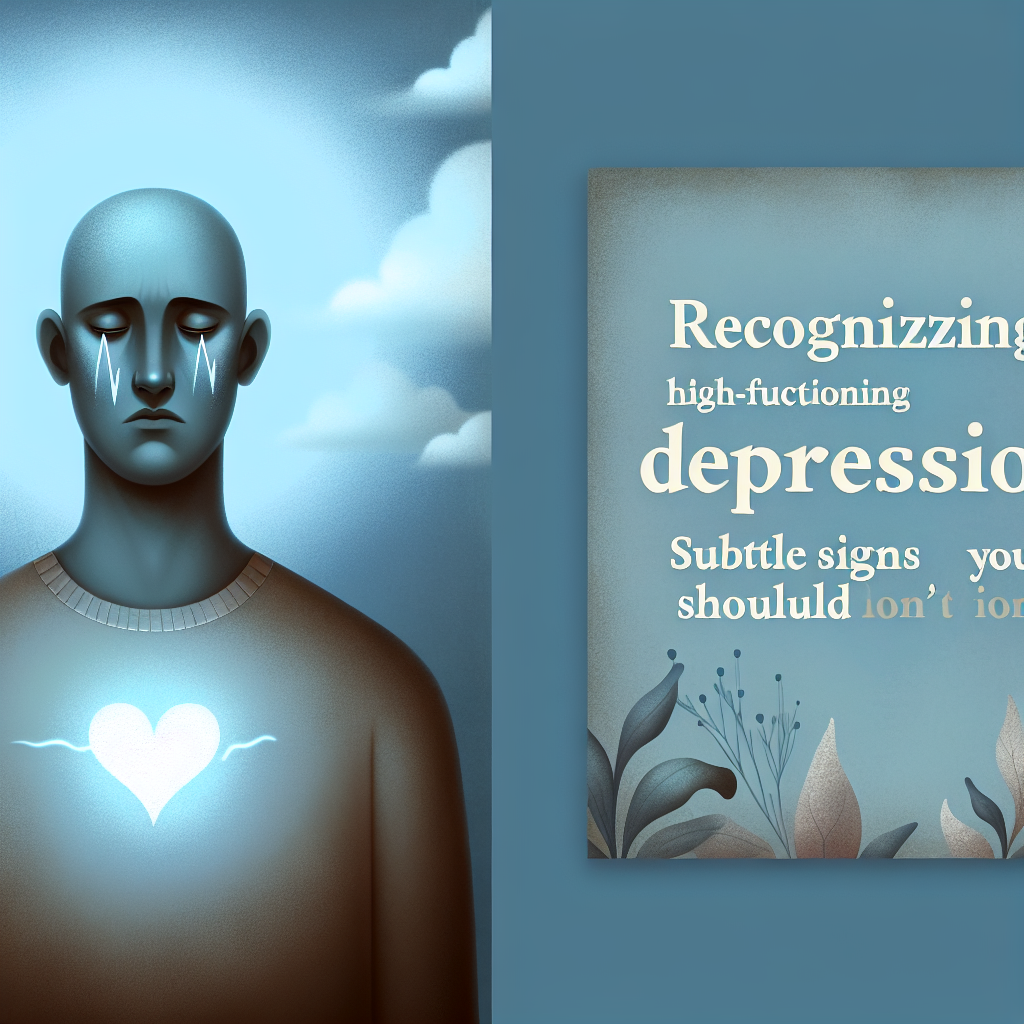
Recognizing High-Functioning Depression: Subtle Signs You Shouldn’t Ignore
Introduction
Imagine someone who appears to have it all together—a stable job, an active social life, and a seemingly positive demeanor. Yet beneath this polished exterior lurks a hidden struggle: high-functioning depression. This condition allows individuals to operate in daily life while battling deep emotional pain that often goes unnoticed by others. In this article, we will delve into the nuances of recognizing high-functioning depression, exploring subtle signs you shouldn’t ignore. Understanding these signals is crucial for both those affected and their loved ones, who may not recognize the struggle beneath the surface.
Understanding High-Functioning Depression
What is High-Functioning Depression?
High-functioning depression, known clinically as persistent depressive disorder (dysthymia), is characterized by chronic low mood that persists for at least two years. Unlike major depressive disorder, those who are high-functioning can maintain daily responsibilities, yet they often experience significant emotional distress.
Key Characteristics
- Chronic Low Energy: Individuals frequently feel lethargic but still manage to carry out daily tasks.
- Underlying Sadness: A constant feeling of sadness or emptiness often remains hidden.
- High Achievement: Many high-functioning individuals excel in their careers and personal lives, contributing to the misconception that they are doing fine.
Understanding these traits is the foundation for effectively recognizing high-functioning depression: subtle signs you shouldn’t ignore.
Subtle Signs of High-Functioning Depression
1. Chronic Fatigue and Sleep Disturbances
One of the most common yet often overlooked signs of high-functioning depression is chronic fatigue. Individuals may feel exhausted regardless of how much rest they get.
Analysis:
A person might seem active during the day but feel drained afterward. They may say, "I slept well last night," yet still crave a nap. This phenomenon can lead to serious physical health issues if not addressed.
| Fatigue Signs | Daytime Feelings | Nighttime Feelings |
|---|---|---|
| Lethargy | Irritability | Trouble falling asleep |
| Mental fog | Reduced motivation | Frequent waking |
| Anxiety | Difficulty focusing | Restlessness |
2. Emotional Numbness
High-functioning individuals may experience a sense of emotional numbness. They can actively participate in social situations but feel disconnected from the emotions typically associated with them.
Case Study:
Consider the case of Anna, a 35-year-old marketing executive who attends regular networking events. Despite her success and outwardly sociable demeanor, she often feels numb during interactions. This disconnect led her to believe her feelings were unfounded. Recognizing this subtle sign of high-functioning depression, she sought therapy and began to reconnect with her emotions.
3. Irritability Over Small Issues
Another subtle yet telling sign is becoming easily irritated over minor matters. This irritable mood can often be misattributed to stress or fatigue.
Relevance:
Feeling irritated can stem from suppressed feelings of sadness or frustration. The pressure to maintain a façade can lead to emotional outbursts over trivial issues, making this a key indicator in recognizing high-functioning depression.
4. The Need for Continuous Validation
Many high-functioning individuals seek constant reassurance from friends and colleagues. Despite outward success, they grapple with feelings of inadequacy.
Analysis:
For example, John, a software engineer, continually revisits his past work to seek validation from peers. This behavior stems from his deep-seated fears of failure and self-doubt—not evident to those around him.
5. Avoidance of Deep Conversations
Those with high-functioning depression often shy away from discussing their feelings or personal struggles, opting instead for superficial topics.
Insight:
This avoidance can be a defense mechanism to maintain their image while safeguarding their emotional vulnerability. Understanding this behavior is essential in recognizing high-functioning depression: subtle signs you shouldn’t ignore.
6. Overcommitment to Projects
Many high-functioning individuals throw themselves into work or hobbies as a means of avoiding their feelings. While they might appear productive, this overcommitment can lead to burnout.
Case Study:
Emily, a high-achieving teacher, took on extra assignments to distract from her deep feelings of sadness. This led to burnout and worsened her mental health. By acknowledging her workaholic tendencies, she began to address her depression through therapy and self-care practices.
7. Struggles with Hope and Optimism
High-functioning individuals may grapple with hopelessness while presenting a facade of optimism. This internal conflict can create cognitive dissonance that’s hard to manage.
| Signs of Hopelessness | Manifestation | Impact |
|---|---|---|
| Feeling trapped | Avoiding long-term plans | Impaired relationships |
| Negative self-talk | Downplaying successes | Heightened anxiety |
The Importance of Recognition
Recognizing high-functioning depression is not only vital for the individuals suffering but also for friends and family members who may notice changes in behavior. Being aware of these subtle signs can lead to better support systems and interventions.
Why Ignoring the Signs is Risky
Ignoring the small signs can lead to exacerbated symptoms and further mental health complications. Often, high-functioning depression can manifest into more severe conditions such as major depressive disorder or anxiety disorders.
Actionable Insights: What to Do Next?
For Individuals
- Journal Your Thoughts: Regularly writing down feelings can provide clarity and facilitate conversation with a mental health professional.
- Seek Professional Help: Therapy, counseling, or medication can be crucial in managing symptoms.
- Practice Mindfulness: Engaging in mindfulness exercises can help ground emotions and foster connections with feelings.
For Friends and Family
- Open Conversations: Encouraging open dialogues without judgment can help individuals feel safe sharing their feelings.
- Educate Yourself: Understanding the complexities of high-functioning depression enables better support.
- Offer Help: Be proactive in offering assistance in managing daily tasks or professional responsibilities.
Conclusion
Recognizing high-functioning depression: subtle signs you shouldn’t ignore is crucial in fostering a supportive environment for those affected. By understanding the complexities of this condition and its less obvious manifestations, we empower ourselves and our loved ones to seek help, validate their feelings, and lead healthier lives. Remember, recognizing high-functioning depression isn’t about laying blame but rather about opening up pathways to healing.
FAQs
1. How is high-functioning depression diagnosed?
High-functioning depression is typically diagnosed by a mental health professional through interviews, assessments, and discussions about daily functioning and mood.
2. Can individuals with high-functioning depression seek therapy?
Yes, therapy is a beneficial option. Many find support in cognitive-behavioral therapy or talk therapy to address their unique challenges.
3. Is medication necessary for high-functioning depression?
Not always. While some individuals benefit from medication, others find success through therapy and lifestyle changes. It’s essential to consult a professional.
4. What are some coping strategies for those with high-functioning depression?
Coping strategies may include mindfulness practices, physical activity, journaling, and maintaining strong support networks.
5. How can friends and family help someone with high-functioning depression?
Offering emotional support, being patient, encouraging professional help, and engaging in meaningful conversations can significantly assist those struggling.
Recognizing high-functioning depression: subtle signs you shouldn’t ignore is the first step towards improving mental health and well-being.















